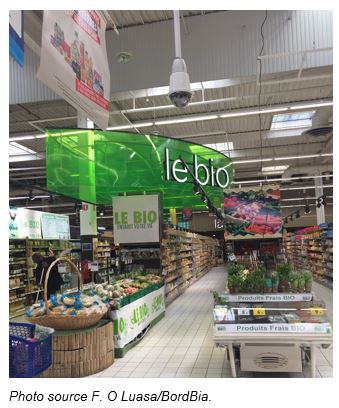Finnian O’ Luasa, Paris Office Bord Bia – Irish Food Board
The French agency for organic food “Agence Bio” recently presented latest trends which show a consistent and continued increase in production and consumption.
International organic retail sales in 2016 have doubled since 2010 and quadrupled since 2004 to reach a global market of 85 billion €. In 2016 organic agricultural land reached an all-time high of 57.8 million hectares which is a 15% increase on 2015 and brings the share of organic agricultural land to 1.2%.
The world’s top 5 organic markets are the US, Germany, France, China and Canada. However, the share of the organic food market over the total market is highest in Denmark, Luxembourg, Switzerland, Austria and Sweden. This demonstrates the remaining potential in high population countries to increase even further their consumption of organic foods, for example, if France with a 4.4% organic/total food market share came closer to Denmark’s 9.7% organic/total food market share.
The French government has announced their objective of achieving 15% of the farming surface as organic or in conversion to becoming organic by 2022. This will require a 62% increase in the budget for organic agriculture to reach 1.1 billion € for the period 2018-2022. A second objective declared is to serve 20% of organic products in public canteens by 2022.
The French market for organic food was estimated at 8.37 billion€ in 2017 which is an increase of 17% compared to 2016 following a 21.7% increase in 2016 compared to 2015. Home consumption of organic products in France in 2017 represented 7.9 billion €, an increase of 18% compared to 2016 and a 4.4% share of overall food consumption.
82% of French consumers stated that they trust organic foods and 85% are of the opinion that it’s important to continue developing organic production. 15% of French consume organic food daily compared to 10% in 2015. The main reasons given by the French consumer for consuming organic foods are 1; health 2. The environment and 3. Quality or taste.
These trends are further echoed on a global scale under Bord Bia’s consumer lifestyle trends study, notably for responsible living.
On a European level the Council adopted new rules on May 22nd for organic production and the labelling of organic products, due to be applied from the 1st January 2021:
- production rules will be simplified and further harmonised through the phasing out of a number of exceptions and derogations
- the control system will be strengthened thanks to tighter precautionary measures and robust risk-based checks along the entire supply chain
- producers in third countries will have to comply with the same set of rules of those producing in the EU
- the scope of organic rules will be enlarged to cover a wider list of products (e.g. salt, cork, beeswax, maté, vine leaves, palm hearts) and additional production rules (e.g. deer, rabbits and poultry)
- certification will be easier for small farmers thanks to a new system of group certification
- there will be a more uniform approach to reduce the risk of accidental contamination from pesticides
- derogations for production in demarcated beds in greenhouses will be phased out






